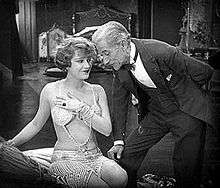Das Spielzeug von Paris
Das Spielzeug von Paris (English title Red Heels) is an Austrian silent film released in 1925 and directed by Michael Curtiz. It was the first film to feature French actress Lili Damita in the leading role.
| Das Spielzeug von Paris | |
|---|---|
 Lili Damita and Georges Treville | |
| Directed by | Michael Curtiz |
| Produced by | Arnold Pressburger |
| Based on | Red Heels by Margery Lawrence |
| Starring | Lili Damita Eric Barclay Hugo Thimig Georges Treville |
| Cinematography | Gustav Ucicky, Max von Nekut |
| Distributed by | Sascha-Film |
Release date | October 16, 1925 |
| Country | Austria |
| Language | silent |
Plot
A young British Bohemian (Eric Barclay), who lives in Paris, marries a stage dancer (Lili Damita). He persuades her to give up her stage career, and they take a cottage in the country. She accepts an invitation from her former manager (Georges Treville) to attend a party. She performs a dance at the party. She quarrels with her husband, but starts searching for him in the countryside on a stormy night. As a result, she catches pneumonia and nearly dies. After being nursed back to health by her husband, she decides to give up the stage for good.
Cast
- Lili Damita
- Hugo Thimig
- Eric Barclay
- Georges Tréville
- Theo Shall
- Hans Moser
- Marietta Millner
- Maria Fein as Fürstin Katharina
Production
Based on the novel Red Heels by Margery Lawrence, Das Spielzeug von Paris was filmed largely in Paris by the Austrian company Sascha-Film with the help of finance from the German FPS and the British Stoll film companies.
Reception
Critical response
The film was well received by the film magazines of the time, although sometimes the storyline was criticised for being kitsch. Artur Berger's sets in particular were highly praised by film reviewers. The film was universally regarded as a success. Sascha-Film made two more films with the same team. Samuel Goldwyn invited Lili Damita to Hollywood after watching this film.
Other information
Availability
Some copies of the film still exist, the most complete having Spanish intertitles. An advertising trailer also exists.
Pop culture
The film inspired the song Tired of Dancing by William Helmore.
Soundtrack
The original score of the film is considered lost. In 2009, Austrian musician Florian C. Reithner composed and recorded a new score in which he plays the original "Welte - Kinoorgel" (a cinema organ by German organ manufacturer "Welte") at "Filmmuseum Potsdam", Germany. The new music was first brought to audience in a broadcast by French television channel "France 3" in Winter 2009.
See also
References
- Poupée de Paris 1925 French booklet by Union Artistic Films